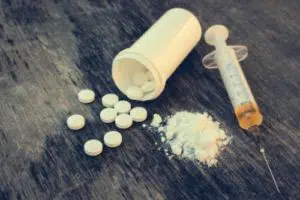 Heroin is a highly addictive opiate drug that can be injected, snorted, or smoked. While using heroin, people experience a euphoric or high feeling and often feel calm or drowsy. Over time, heroin can have a profound effect on a person’s brain. It can deteriorate the physical brain tissue and inhibit people’s ability to make good decisions and learn effectively. Because heroin is so addictive, people who use it are at increased risk of overdose and death.
Heroin is a highly addictive opiate drug that can be injected, snorted, or smoked. While using heroin, people experience a euphoric or high feeling and often feel calm or drowsy. Over time, heroin can have a profound effect on a person’s brain. It can deteriorate the physical brain tissue and inhibit people’s ability to make good decisions and learn effectively. Because heroin is so addictive, people who use it are at increased risk of overdose and death.
When people attempt to quit using heroin, their withdrawal symptoms can be brutal. Restlessness, severe bone and muscle pain, insomnia, diarrhea, and vomiting are common. These physical symptoms are often accompanied by intense cravings that make a complete detox almost impossible. People must get treatment at a drug detox to have a safe, successful detox from heroin. There are three main aspects of drug detox that people need to complete to get off heroin and start living the healthy, fulfilling lives they deserve.
Jump to Section
Taking the First Step: Heroin Detox
Detox is usually the first step to quitting heroin. If the body becomes dependent on heroin, quitting can be brutal, and many people experience intense cravings in the early stages of withdrawal. Without medically supervised detox, most people are unsuccessful in avoiding a relapse.
During heroin detox, people receive medications to help manage the discomfort of withdrawal. They are also given distance and time away from heroin, making it more likely to have a safe, complete detox.
Using Medications During Heroin Addiction Rehab
After detox, people must participate in addiction treatment. Heroin addiction rehab usually consists of therapy, education, holistic therapies, and medications. The medications provided in heroin addiction rehab are used to prevent cravings for heroin and ease the physical and mental discomfort people feel when withdrawing from opiates. Some medications bind to the same receptors as opiate drugs, and others block the “high” that comes from using opiates. Three of the most common drugs used in heroin addiction rehab are Methadone, Buprenorphine, and Naltrexone.
Medications are used during heroin addiction rehab alongside other evidence-based and holistic therapies to help people avoid relapsing while undergoing treatment. The length of time people take medications depends on the length and severity of their addiction and other factors.
Behavioral Therapies in Heroin Addiction Treatment
Addiction is not just a physical condition. To have the best chance of fully overcoming addiction and remaining sober for life, people must receive mental health treatment and support during addiction treatment. There are many different therapeutic approaches used as part of addiction treatment programs. The three most commonly used are:
- Cognitive-behavioral therapy: People work with their therapist to identify and change habits and thoughts that lead to destructive behaviors.
- Contingency Management: People receive tangible rewards for accomplishments and meeting certain milestones. For example, someone might receive sports or movie tickets for having a clean drug test.
- Motivational Interviewing: Through a series of special interviews, the therapist helps their clients identify their reasons for stopping using drugs and increasing their own internal motivation to change.
There is no one-size-fits-all approach to addiction counseling. The most important thing is to find the right approach for each person in treatment.
Learn More About Drug Detox at the Northern Illinois Recovery Center




Licensed Physician and Surgeon
Dr. Beth Dunlap, a board-certified addiction medicine and family medicine physician, and is the medical director at Northern Illinois Recovery Center. She is responsible for overseeing all the integrated medical services at both campuses. Beth completed medical school, residency, and fellowship at Northwestern University, where she continues to serve on the faculty as a member of the Department of Family and Community Medicine. She has extensive experience in addiction medicine at all levels of care, and her clinical interests include integrated primary care and addiction medicine, harm reduction, and medication-assisted treatment.



